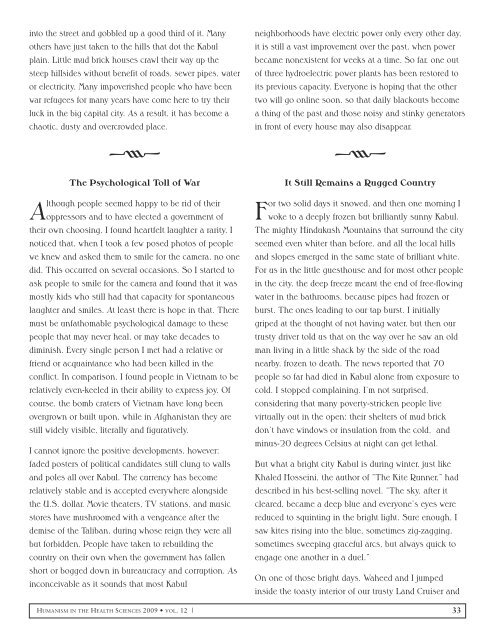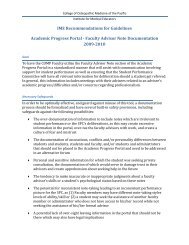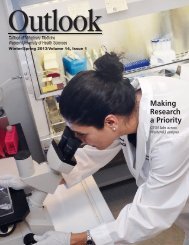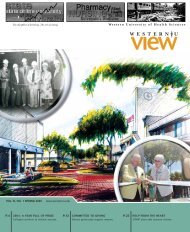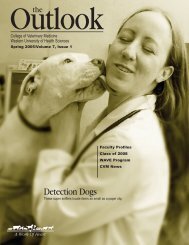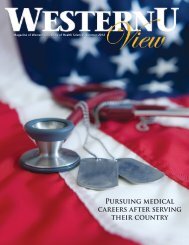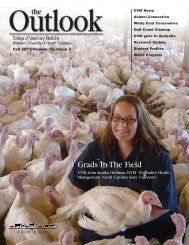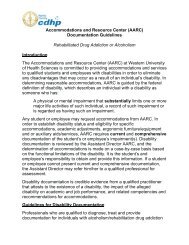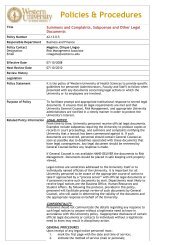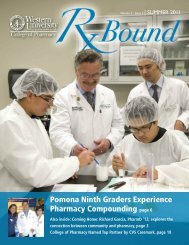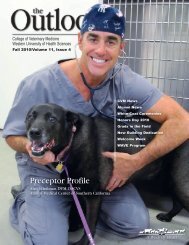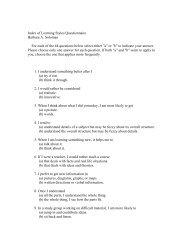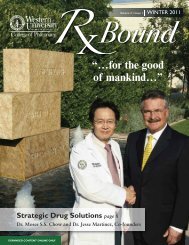Humanism 2009 - Western University of Health Sciences
Humanism 2009 - Western University of Health Sciences
Humanism 2009 - Western University of Health Sciences
Create successful ePaper yourself
Turn your PDF publications into a flip-book with our unique Google optimized e-Paper software.
into the street and gobbled up a good third <strong>of</strong> it. Many<br />
others have just taken to the hills that dot the Kabul<br />
plain. Little mud brick houses crawl their way up the<br />
steep hillsides without benefit <strong>of</strong> roads, sewer pipes, water<br />
or electricity. Many impoverished people who have been<br />
war refugees for many years have come here to try their<br />
luck in the big capital city. As a result, it has become a<br />
chaotic, dusty and overcrowded place.<br />
�<br />
The Psychological Toll <strong>of</strong> War<br />
Although people seemed happy to be rid <strong>of</strong> their<br />
oppressors and to have elected a government <strong>of</strong><br />
their own choosing, I found heartfelt laughter a rarity. I<br />
noticed that, when I took a few posed photos <strong>of</strong> people<br />
we knew and asked them to smile for the camera, no one<br />
did. This occurred on several occasions. So I started to<br />
ask people to smile for the camera and found that it was<br />
mostly kids who still had that capacity for spontaneous<br />
laughter and smiles. At least there is hope in that. There<br />
must be unfathomable psychological damage to these<br />
people that may never heal, or may take decades to<br />
diminish. Every single person I met had a relative or<br />
friend or acquaintance who had been killed in the<br />
conflict. In comparison, I found people in Vietnam to be<br />
relatively even-keeled in their ability to express joy. Of<br />
course, the bomb craters <strong>of</strong> Vietnam have long been<br />
overgrown or built upon, while in Afghanistan they are<br />
still widely visible, literally and figuratively.<br />
I cannot ignore the positive developments, however:<br />
faded posters <strong>of</strong> political candidates still clung to walls<br />
and poles all over Kabul. The currency has become<br />
relatively stable and is accepted everywhere alongside<br />
the U.S. dollar. Movie theaters, TV stations, and music<br />
stores have mushroomed with a vengeance after the<br />
demise <strong>of</strong> the Taliban, during whose reign they were all<br />
but forbidden. People have taken to rebuilding the<br />
country on their own when the government has fallen<br />
short or bogged down in bureaucracy and corruption. As<br />
inconceivable as it sounds that most Kabul<br />
neighborhoods have electric power only every other day,<br />
it is still a vast improvement over the past, when power<br />
became nonexistent for weeks at a time. So far, one out<br />
<strong>of</strong> three hydroelectric power plants has been restored to<br />
its previous capacity. Everyone is hoping that the other<br />
two will go online soon, so that daily blackouts become<br />
a thing <strong>of</strong> the past and those noisy and stinky generators<br />
in front <strong>of</strong> every house may also disappear.<br />
�<br />
It Still Remains a Rugged Country<br />
For two solid days it snowed, and then one morning I<br />
woke to a deeply frozen but brilliantly sunny Kabul.<br />
The mighty Hindukush Mountains that surround the city<br />
seemed even whiter than before, and all the local hills<br />
and slopes emerged in the same state <strong>of</strong> brilliant white.<br />
For us in the little guesthouse and for most other people<br />
in the city, the deep freeze meant the end <strong>of</strong> free-flowing<br />
water in the bathrooms, because pipes had frozen or<br />
burst. The ones leading to our tap burst. I initially<br />
griped at the thought <strong>of</strong> not having water, but then our<br />
trusty driver told us that on the way over he saw an old<br />
man living in a little shack by the side <strong>of</strong> the road<br />
nearby, frozen to death. The news reported that 70<br />
people so far had died in Kabul alone from exposure to<br />
cold. I stopped complaining. I’m not surprised,<br />
considering that many poverty-stricken people live<br />
virtually out in the open; their shelters <strong>of</strong> mud brick<br />
don’t have windows or insulation from the cold, and<br />
minus-20 degrees Celsius at night can get lethal.<br />
But what a bright city Kabul is during winter, just like<br />
Khaled Hosseini, the author <strong>of</strong> “The Kite Runner,” had<br />
described in his best-selling novel. “The sky, after it<br />
cleared, became a deep blue and everyone’s eyes were<br />
reduced to squinting in the bright light. Sure enough, I<br />
saw kites rising into the blue, sometimes zig-zagging,<br />
sometimes sweeping graceful arcs, but always quick to<br />
engage one another in a duel.”<br />
On one <strong>of</strong> those bright days, Waheed and I jumped<br />
inside the toasty interior <strong>of</strong> our trusty Land Cruiser and<br />
HUMANISM IN THE HEALTH SCIENCES <strong>2009</strong> • VOL. 12 | 33


